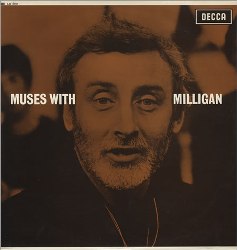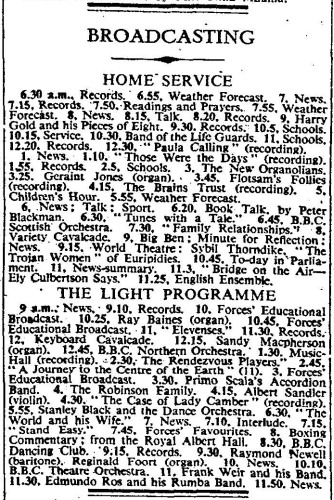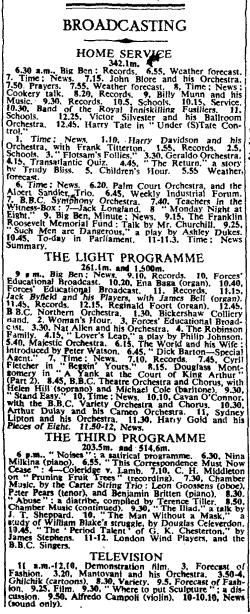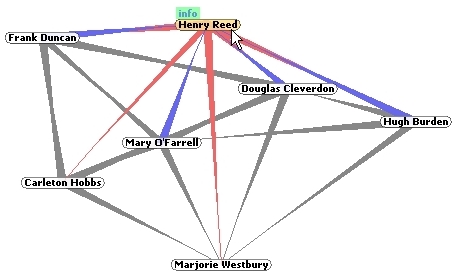|
|
Documenting the quest to track down everything written by
(and written about) the poet, translator, critic, and radio
dramatist, Henry Reed.
An obsessive, armchair attempt to assemble a comprehensive
bibliography, not just for the work of a poet, but for his
entire life.
Read " Naming of Parts."
|
Contact:
|
|
|
|
Reeding:
|
 |
I Capture the Castle: A girl and her family struggle to make ends meet in an old English castle.
|
 |
Dusty Answer: Young, privileged, earnest Judith falls in love with the family next door.
|
 |
The Heat of the Day: In wartime London, a woman finds herself caught between two men.
|
|
|
|
Elsewhere:
|
|
All posts for "BBC"
|
|
|
27.7.2024
|
In 1963, The Goon Show's Spike Milligan co-starred with folk guitarist Steve Benbow in a London stage show at the old Lyric Theatre. Aptly titled Spike Milligan Meets Steve Benbow, this pairing led to the development of a BBC2 television program made up of "irreverently assorted coruscations of jazz and poetry," Muses with Milligan, which ran from December 1964 through October 1965.
Muses with Milligan was an "attempt to work poetry into the normal currency of entertainment," featuring musical acts alternating with Milligan meeting the leading English and Irish poets of the day. John Betjeman was a frequent guest; Adrian Mitchell and Robert Graves made appearances. And here, in an issue of Socialist Commentary from 1967, is this sentence: "Henry Reed reciting his Naming of Parts is a treasured memory from the very mixed Muses with Milligan series."
I don't suppose you'd mind dropping me a copy of that show, Auntie Beeb?
A collection of Milligan's witty, nonsense poetry from the show (generally described as Edward Lear-ish), was released in 1965 on a Decca LP (pictured).
|
1537. Radio Times, "Full Frontal Pioneer," Radio Times People, 20 April 1972, 5.
A brief article before a new production of Reed's translation of Montherlant, mentioning a possible second collection of poems.
|
Did you know Henry Reed's play, Return to Naples, was part of the same radio series that produced Dylan Thomas's Return Journey to Swansea?
According to Peter Lewis, in his chapter on Dylan Thomas in British Radio Drama (Drakakis, ed., 1981), "The Radio Road to Llareggub," the feature series Return Journey consisted of twenty-four episodes broadcast on the Home Service and Third Programme between 1945 and 1951 (p. 92). In The Growth of Milk Wood (1961), Douglas Cleverdon says the series was originally devised by the BBC Features Department
in order to lure writers of distinction into the radio field; they were commissioned to return to their native town, or to some other place that had powerful associations for them, and to write a programme about it, in the form of a semi-autobiographical talk interspersed by dramatized flashbacks, extracts from journals, actual recordings—anything, in fact, that might illuminate the theme. [p. 15]
Scanning the broadcasting schedules in The Times for those years finds these episodes:
- Eric Linklater to the Orkneys (October 31, 1945)
- John and Rosamond Lehmann on the Isle of Wight (April 13, 1946)
- Palace Court, Bayswater, revisted by Sir Francis Meynell and Viola Meynell (September 2, 1946)
- V.S. Pritchett, Return to the Fells (October 13, 1946)
- Edward Sackville-West to Knole (April 9, 1947)
- Dylan Thomas to Swansea (June 15, 1947)
- Stevie Smith to Syler's Green (August 5, 1947)
- Rayner Heppenstall to Strasbourg (September 16, 1948)
- Sean O'Faoláin to Cork (November 20, 1948)
- Christopher Sykes to Berlin (February 19, 1949)
- Henry Reed, Return to Naples (August 17, 1950)
W.R. Rodgers apparently also wrote for Return Journey, though I can't find the title. Mountpottinger, Belfast, perhaps? Several programs were produced by Stephen Potter, and the series was originally conceived by R.D. "Reggie" Smith.
|
1536. L.E. Sissman, "Late Empire." Halcyon 1, no. 2 (Spring 1948), 54.
Sissman reviews William Jay Smith, Karl Shapiro, Richard Eberhart, Thomas Merton, Henry Reed, and Stephen Spender.
|
Deep in the Written Archives of the BBC is a collection of letters and memos relating to George Orwell's time as a Talks Producer with the Eastern Service, writing and broadcasting wartime news and propaganda to India from 1941 to 1943. The archive continues to follow Orwell's activities even after his resignation, in the correspondence of Rayner Heppenstall: poet, writer, and producer of features and drama at the BBC from 1945 until 1967. A selection of these documents have been dutifully reproduced for the digital collection, George Orwell at the BBC.
In a letter dated July 8, 1946, Heppenstall belatedly congratulates Orwell on Animal Farm being selected for a future "Book of the Month Club" edition in the United States. Heppenstall received the announcement, apparently, via Henry Reed, who "was in the publisher's office when the news came in":
Click the image to see Heppenstall's original letter at the BBC Archive, or here for the plain text version.
Reed's friendship with Rayner Heppenstall is well documented. In his 1969 memoir, Portrait of the Artist as a Professional Man, Heppenstall brags about introducing Reed (and a host of other BBC writers and staff) to the Stag's Head Pub, across the street from the Features and Drama offices on London's New Cavendish Street. Heppenstall produced Reed's second radio play for the Third Programme, Pytheas: A Dramatic Speculation, in 1947.
What I am having difficulty figuring out is: which publisher's office was Reed visiting in 1946, when he heard the book club news? Animal Farm was originally published in 1945 by Martin Secker & Warburg, London, but the American edition of Orwell's "fairy tale" was released the following year by Harcourt Brace, New York. Much of Heppenstall's output of the 1940s, however, was also published by Secker & Warburg. Frank V. Morley, whom Heppenstall mentions, was a director at Faber and Faber. Henry Reed did publish a book with Secker, an English translation of Buzatti's Larger than Life, but not until 1962. Confusing. And I've only had coffee for dinner; too much coffee.
It seems most likely, given the time frame, that Reed was simply visiting the publisher of his own first book of poetry, Jonathan Cape, who had only recently released A Map of Verona: Poems in May, 1946. Is that how you read it?
|
1535. Reed, Henry. "Talks to India," Men and Books. Time & Tide 25, no. 3 (15 January 1944): 54-55.
Reed's review of Talking to India, edited by George Orwell (London: Allen & Unwin, 1943).
|
In November of 1947, Henry Reed wrote a letter to George Barnes, Controller for the BBC's Third Programme ( picture of Barnes, later the Director of BBC Television). The letter was ostensibly about a radio adaptation of The Dynasts, Thomas Hardy's epic verse drama of the Napoleonic Wars. Reed, however, took the time to expound on the art of broadcasting, specifically rejecting the idea that the dramatist's main role is to maintain the illusion for the listener. An excerpt from this letter appears in John Drakakis' Introduction to British Radio Drama:
It is a myth that Radio has any capacity for inducing in the mind of the listener anything in the nature of particularized visualization. You might, once in an evening persuade him to see one of those great stage directions; but not, I think, more than one. For when radio had to suggest a scene to the listener, it does best to give only a brief powerful hint from which, with the help of specially written dialogue designed to an end, the listener can without effort and perhaps only half-consciously, construct a scene from the innumerable landscapes or roomscapes (!) bundled away in his own memory. (p. 22-23)
Apparently, having had a total of two full-length plays broadcast in 1947 ( Moby Dick, and Pytheas), Reed felt confident enough to tell the Controller how radio works, and how their listeners listen. Reed's six-part adaptation of Hardy's Dynasts was broadcast on consecutive evenings in June of 1951. The original letter resides in the BBC Written Archives.
|
1534. Reed, Henry. "Radio Drama," Men and Books. Time & Tide 25, no. 17 (22 April 1944): 350-358 (354).
Reed's review of Louis MacNeice's Christopher Columbus: A Radio Play (London: Faber, 1944).
|
The BBC Programme Catalogue is back in Beta, with a new look and a slight change of address.
Everything appears to work the same as the "experimental" version which has been out since the spring of 2006, although I think there's been some re-organization of the way data is displayed in series and one-offs. Correct me if I'm wrong.
The first thing I noticed was this entry for a 1987 recording of Reed's Emily Butter: 'The first performance of Hilda Tablet's opera at the Royal Opera House, Covent Garden. Starring Mary O'Farrell and Hugh Burden. Music realised by Max Saunders with orchestrations by Max Saunders.' I'm not at all sure I'd ever seen that before!
|
1533. Friend-Periera, F.J. "Four Poets," Some Recent Books, New Review 23, no. 128 (June 1946), 482-484 [482].
A short review calls A Map of Verona more pretentious than C.C. Abbott's The Sand Castle; influenced by Eliot, Auden, MacNeice, and Day Lewis.
|
Is this the humble beginning of Henry Reed's writing career with BBC radio?
Roger Savage, writing in the book British Radio Drama (1981), says Reed's first original writing for radio was a 1946 piece called Noises, produced first in a fifteen-minute version for an interlude between programs, and then extended to a full half-hour. Martin Armstrong, in The Listener, described the piece as
a short essay on the psychology of noises in which noises were used to play, wittily and suggestively, on the imagination of the listener (November 28, 1946).
British Radio Drama includes a bibliography of Reed's radio plays and the dates of their premieres— Noises is listed as having first aired on the BBC on March 4, 1946:
As you can see, the only "Interlude" scheduled is a five-minute break on the Light Programme at 7:10 p.m., although there is a fifteen-minute "Forces' Favourites" at 7:45 which could be a candidate.
The extended version of Noises which Armstrong reviewed for The Listener was broadcast later that year, on November 18, 1946, at 6:00 p.m. By that time, the Third Programme had been created, and the piece had earned a subtitle (as many of Reed's plays would) "A satirical programme":
Unfortunately, in some books the play is also listed as Noises On (as in the opposite of "noises off-stage"), and the longer version as Noises—Nasty and Nice, causing me all sorts of difficulties in searching and pinning down dates and times.
|
1532. Vallette, Jacques. "Grand-Bretagne," Mercure de France, no. 1001 (1 January 1947): 157-158.
A contemporary French language review of Reed's A Map of Verona.
|
Working from the (somewhat incestuous) bibliographies in British Radio Drama, Contemporary Authors, Contemporary Poets, and The Dictionary of National Biography, here's a nearly complete list of Henry Reed's writing for radio, including his translations from French and Italian (but not his talks or criticism): - Noises (4 March 1946)
- Noises—Nasty and Nice (1947)
- Moby Dick: A Play for Radio from Herman Melville's Novel (26 January 1947)
- Pytheas: A Dramatic Speculation (25 May 1947)
- The Unblest: A Study of the Italian Poet Giacomo Leopardi as a Child and in Early Manhood (9 May 1949)
- The Monument: A Study of the Last Years of the Italian Poet Giacomo Leopardi (7 March 1950)
- Return to Naples (17 August 1950)
- Canterbury Cathedral: An Exploration in Sound (with Elisabeth Lutyens, 7 November 1950)
- A By-Election in the Nineties (3 March 1951)
- The Dynasts (adapted from Thomas Hardy, 3-9 June 1951)
- Malatesta (translation, Henry de Montherlant, 26 February 1952)
- The Streets of Pompeii (16 March 1952)
- The Great Desire I Had: Shakespeare and Italy (26 October 1952)
- Westminster Abbey (with Elisabeth Lutyens, 1953)
- A Very Great Man Indeed (7 September 1953)
- All for the Best (translation, Luigi Pirandello, 22 November 1953)
- The Private Life of Hilda Tablet: A Parenthesis for Radio (24 May 1954)
- Hamlet; or, The Consequences of Filial Piety (translation, Jules Laforgue, June 20 1954)
- The Battle of the Masks (translation, Virginio Puecher, 6 September 1954)
- The Queen and the Rebels (translation, Ugo Betti, 17 October 1954)
- Emily Butter: An Occasion Recalled (14 November 1954)
- The Burnt Flower-Bed (translation, Ugo Betti, 23 January 1955)
- Vincenzo: A Tragicomedy (29 March 1955)
- Holiday Land (translation, Ugo Betti, 5 June 1955)
- A Hedge, Backwards (29 February 1956)
- Crime on Goat Island (translation, Ugo Betti, 7 October 1956)
- Don Juan in Love (translation, Samy Fayad, 5 November 1956)
- Alarica (translation, Jaques Audiberti, 22 September 1956)
- Irene (translation, Ugo Betti, 20 October 1957)
- Corruption in the Palace of Justice (translation, Ugo Betti, 19 January 1958)
- The Auction Sale (poem, 20 September 1958)
- The Primal Scene, As It Were: Nine Studies in Disloyalty (11 March 1958)
- Not a Drum Was Heard: The War Memoirs of General Gland (6 May 1959)
- One Flesh (translation, Silvio Giovaninetti, 12 June 1959)
- The Land Where the King Is a Child (translation, Henry de Montherlant, 3 October 1959)
- Musique Discrète: A Request Programme of Music by Dame Hilda Tablet (with Donald Swann, 27 October 1959)
- The House on the Water (translation, Ugo Betti, 3 February 1961)
- A Hospital Case (translation, Dino Buzzati, 22 November 1961)
- The America Prize (translation, Dino Buzzati, 18 June 1964)
- Zone 36 (translation, Dino Buzzati, 22 March 1965)
- The Complete Lessons of the War (poems, 14 February 1966)
- The Advertisement (translation, Natalia Ginzburg, 24 September 1968)
- Summer (translation, Romain Weingarten, 3 October 1969)
- The Two Mrs. Morlis (translation, Luigi Pirandello, 8 November 1971)
- The Strawberry Ice (translation, Natalia Ginzburg, 21 January 1973)
- Room for Argument (translation, Luigi Pirandello, 7 January 1974)
- The Wig (translation, Natalia Ginzburg, 23 March 1976)
- Like the Leaves (translation, Giuseppe Giacosa, 24 May 1976)
- Duologue (translation, Natalia Ginzburg, 3 January 1977)
- The Soul Has Its Rights (translation, Giuseppe Giacosa, 22 June 1977)
- Sorrows of Love (translation, Giuseppe Giacosa, 23 October 1978)
- Moby Dick (new production of 1947 play, 2 February 1979)
- I Married You for Fun (translation, Natalia Ginzburg, 7 January 1980)
It's likely some of the dates are incorrect, owing to frequent rebroadcasts and re-adaptations, and I've yet to find a record for the broadcast in 1953 of Reed's collaboration with the composer Elizabeth Lutyens on her BBC-commissioned Westminster Abbey. Still, this should be a fairly accurate and (almost) plenary list.
|
1531. Henderson, Philip. "English Poetry Since 1946." British Book News 117 (May 1950), 295.
Reed's A Map of Verona is mentioned in a survey of the previous five years of English poetry.
|
It would appear the BBC Programme Catalogue has awoken from its long slumber, hungry for keywords to devour, eager to reveal its deepest secrets! Huzzah!
|
1530. Radio Times. Billing for "The Book of My Childhood." 19 January 1951, 32.
Scheduled on BBC Midland from 8:15-8:30, an autobiographical(?) programme from Henry Reed.
|
The BBC Programme Catalogue experimental prototype appears to have "entered a review phase", and is "currently unavailable."
Dear BBC: the Programme Catalogue is an important, valuable resource for scholarship and enthusiasts, and should be restored as soon as possible. Less reviewin', more inclusion! Thank you.
|
1529. Sackville-West, Vita. "Seething Brain." Observer (London), 5 May 1946, 3.
Vita Sackville-West speaks admirably of Reed's poetry, and was personally 'taken with the poem called "Lives," which seemed to express so admirably Mr. Reed's sense of the elusiveness as well as the continuity of life.'
|
Two supercool gadgets have appeared in the last week, which manipulate the information available in the BBC Programme Catalogue: a touchgraph applet and a sparkline comparator.
The touchgraph tool is the creation of Alf Eaton of HubLog. It's a Java applet which takes advantage of the FOAF data accompanying each contributor's record in order to produce a dynamic, relational graph: an expandable tree of who's connected to whom in the Catalog. You can double-click each name to extend a node, or click the little green "info" flag for a link to that person's record, and explore away!
Here's Henry Reed's touchgraph (click to open applet):
(Tip: if the links to the Catalog aren't working, reconfigure your browser's options to allow popups!) There's even a handy bookmarklet to launch the applet from inside the Catalog. Thank you, Alf!
The sparkline comparator is a Greasemonkey script for Firefox which enables you to overlay two different sparklines in the Catalog for comparison: the little graphs displaying the frequency of a person's contributions to the BBC. Everything you need to get started using the comparator is available from its author, Phil McCarthy, over at chimpen.com.
This is how Henry Reed's sparkline looks (in black), superimposed with that of his frequent producer, Douglas Cleverdon (red):
You can see the spikes for the majority of Reed's radio plays coincide with a jump for Cleverdon's productions. Isn't that neat? Thanks, Phil!
Now, what the hell is SPARQL?
|
1528. Manning, Hugo. "Recent Verse." Books of the Day, Guardian (Manchester), 31 July 1946, 3.
Manning feels that 'Mr. Reed has worn thin much of his genuine talent in this direction by too much self-inflicted censorship.'
|
Henry Reed wrote several critiques of Edith Sitwell's verse during his career, including a lengthy article for the Penguin New Writing in 1944 ("The Poetry of Edith Sitwell," no. 21: 109-122), and a 1946 review of her collection The Song of the Cold for the New Statesman and Nation ("Pity and Terror," v. 31, no. 779 (26 January): 69).
So I wasn't too terribly surprised to discover the record for a letter Reed had written to Dame Edith in the Manuscript Collection of the Harry Ransom Research Center, at the University of Texas, Austin. And not just a single letter, but a copy of Sitwell's response, and what appears to be a typescript of a 1946 BBC radio program. All three manuscipts are in the Dame Edith Sitwell Collection, 1904-1964. None are dated, and the only references are to box and folder numbers.
Reed's letter appears under the " Index of Correspondents" as Reed, Henry, 1914- --99.2 (Box 99, Folder 2). The section heading states, 'Index entries with no notation (except box and folder numbers) indicate the person listed sent correspondence to Edith Sitwell.' Sitwell's response to Reed appears under the section " Index of Works" as Answer to Henry Reed--1.1. Without some indication of the date, however, it's impossible to divine what the two poets may have corresponded about, although Sitwell did write to John Lehmann in 1944, expressing concern about Reed's article in New Writing ( Edith Sitwell: Selected Letters, 1919-1964. Edited by John Lehmann and Derek Parker. New York: Vanguard Press, 1970. 121).
I felt sure that two letters was more than one could hope for, but in doing a for "reed," I found yet another entry, under "Third Party Works": Reed, Henry, 1914- . Broadcast of The Poet and his Critics--110.4. This sent me into a tizzy of searching: the bibliography, the BBC Programme catalogue, WordAloud.com. No joy!
Finally, after trying several possible keyword combinations for London Times radio schedules, I discovered Sitwell (or Texas) had gotten the title slightly wrong: it's "The Poet and His Critic," singular. The serial, a "survey of contemporary verse," ran on the BBC's Third Programme for a brief time from late 1946 to early 1947. Poets included such estimable subjects as C. Day Lewis, W.J. Turner, Dylan Thomas, and Stephen Spender, with critics like L.A.G. Strong, Gerald Bullett, T.W. Earp, and Roy Fuller.
A good, old fashioned Google search put me dead on the money: in the Cleverdon Manuscript Collection at Indiana University's Lilly Library are scripts from Cleverdon's time as a producer at the BBC. Box 18 contains another script for the program in the Sitwell collection, but this one is labeled The Poet and His Critic--The Poet: Edith Sitwell, The Critic: Henry Reed. Nov. 9, 1946.
|
1527. Rosenthal, M.L. "Experience and Poetry." Herald Tribune Weekly Book Review (New York), 17 October 1948, 28.
Rosenthal says Reed shares with Laurie Lee 'that unhappy vice of young intellectuals—a certain blandness of which the ever-simple irony is a symptom.'
|
The experimental, prototype BBC Programme Catalogue went live today, and currently contains over 900,000 entries for radio and television programs. This represents only a "sub-set" of the data held by the BBC's Information and Archive Department.
Henry Reed has 77 entries! It's mostly recordings located in the Sound Archive, but there's a lot of metadata that's absolutely priceless.
Also, they've have mistakenly concatenated our Henry with that other Henry, a composer and conducter from the 1940s and '50s. How do you straighten that out? Birth and death years in the title field, or descriptors (Author, Composer), at the very least. If you please?
|
1526. Blunden, Edmund. "Poets and Poetry." Bookman, n.s., 1, no. 4 (July 1946): 14-15.
Edmund Blunden says Reed's Lessons of the War poems 'have captured something of the time-spirit and ambiguity of the recent war in a style of wit and deep feeling united.'
|
|
|
|
1st lesson:
Reed, Henry
(1914-1986). Born: Birmingham, England, 22 February 1914; died: London, 8
December 1986.
Education: MA, University of Birmingham, 1936. Served: RAOC, 1941-42; Foreign Office, Bletchley Park, 1942-1945.
Freelance writer: BBC Features Department, 1945-1980.
Author of:
A Map of Verona: Poems (1946)
The Novel Since 1939 (1946)
Moby Dick: A Play for Radio from Herman Melville's Novel (1947)
Lessons of the War (1970)
Hilda Tablet and Others: Four Pieces for Radio (1971)
The Streets of Pompeii and Other Plays for Radio (1971)
Collected Poems (1991, 2007)
The Auction Sale (2006)
|
Search:
|
|
|
Recent tags:
|
Posts of note:
|
Archives:
|
Marginalia:
|
|















